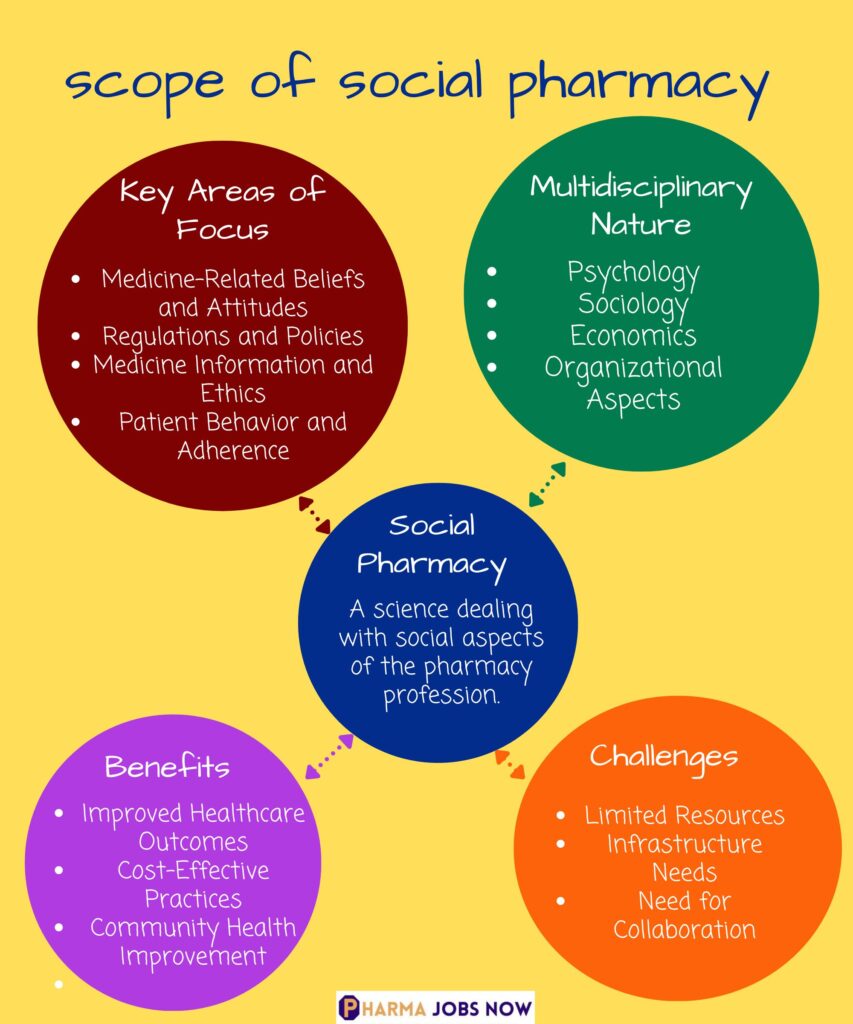Social Pharmacy Definition
Social pharmacy is a science that deals with the social aspects of the profession of pharmacy. It combines knowledge from social and behavioral sciences, including health psychology, to understand beliefs, regulations, policies, attitudes, information, ethics, and behaviors related to medicines.
This field aims to improve how medicines are used and how healthcare is delivered by considering the human and social factors that influence these areas.
Scope of Social Pharmacy
Historical Context
The role of pharmacists has changed a lot over the years. They used to only prepare and give out medicines, but now they talk directly with patients to make sure medicines are used correctly. This shift showed how important it is to understand the social factors that influence how medicines are used, which led to the development of social pharmacy.
As healthcare systems became more complex, pharmacists needed to understand patient behavior and social influences more than ever.
Key Areas of Focus
Social pharmacy covers a wide range of topics, including:
- Medicine-Related Beliefs and Attitudes: Understanding how people think and feel about medicines. This includes why people might be hesitant to take certain medications or how cultural beliefs affect medicine use.
- Regulations and Policies: Looking at the laws and policies that control the use of medicines. These regulations ensure that medicines are safe and used properly.
- Medicine Information: Making sure accurate information about medicines is available and easy to access. This helps patients make informed decisions about their treatment.
- Ethics: Thinking about the ethical issues related to medicine use. This includes fair access to medicines and responsible promotion of pharmaceuticals.
- Behavior: Studying how people’s behavior affects their use of medicines. For example, understanding why people might not follow their prescribed treatment plans.

Benefits of Social Pharmacy
Social Pharmacy as a Discipline
Social pharmacy brings together insights from various social sciences to understand the role of medicines in society. This interdisciplinary approach helps pharmacists be more effective by considering the social and psychological factors that influence medicine use. By doing so, pharmacists can provide better patient care and support.
Scope of Social Pharmacy in Improving Public Health
Social pharmacy plays a crucial role in improving public health by addressing the social factors that influence medicine use. It helps develop strategies for promoting the rational use of medicines, improving patient adherence to treatment, and ensuring that medicines are used safely and effectively. This can lead to better health outcomes and reduced healthcare costs.
Role of Pharmacists in Public Health
Pharmacists provide essential services such as medication counseling, health education, and disease prevention programs. By understanding the social context of medicine use, pharmacists can better address the needs of their communities and contribute to improved health outcomes. They can also identify and address public health issues more effectively.
Dimensions and Determinants of Health
Social pharmacy also looks at the dimensions and determinants of health, including social, economic, and environmental factors. Understanding these factors helps pharmacists develop more effective ways to improve public health. For instance, pharmacists can work on projects to improve access to medicines in underserved areas or to educate communities about healthy lifestyle choices.
National Health Programmes
Social pharmacy supports national health programs by providing valuable insights into how medicines are used in society. This helps design and implement programs that promote the rational use of medicines, improve access to healthcare, and address public health challenges.
Pharmacists can play a key role in national health campaigns, such as vaccination drives or efforts to reduce the misuse of antibiotics.
Read also: Pharmacovigilance Interview Questions PDF 2024 By Pharmajobsnow.com
Scope and Challenges of Social Pharmacy in Training of Pharmacy Students
Incorporation of Social Sciences in Pharmacy Education
Since the early 1980s, efforts have been made to improve pharmacists’ skills and competence. Recommendations from the Nuffield Foundation and other bodies have led to the incorporation of social and behavioral sciences into pharmacy curricula.
This helps students understand human behavior, sociology, and the social aspects of health and illness, preparing them for future practice. It ensures that future pharmacists are well-equipped to handle the social dimensions of healthcare.
Social Pharmacy Programmes Around the World
Pharmacy curricula worldwide now include courses in various scientific and social disciplines. Developed countries like the UK and Canada have successfully integrated social pharmacy into their programs, enhancing patient safety and the rational use of health resources.
However, developing countries often face challenges such as limited resources and infrastructure, which hinder the full integration of social pharmacy into their curricula. These programs help students understand the global context of pharmacy practice.
Addressing Challenges in Developing Countries
Pharmacy education in developing countries often lags behind due to lack of resources, expertise, and infrastructure. Efforts to incorporate social pharmacy into curricula are still in early stages, and there is a need for strategic alliances with organizations like WHO to improve pharmacy education and practice.
By working together, countries can share resources and knowledge to overcome these challenges.
Improving Pharmacy Practice
Improving practice is a key concern in pharmacy, medicine, and nursing. Social pharmacy research plays an important role in documenting practice variations and developing strategies to improve performance.
Collaboration between researchers and practitioners is essential to ensure that new evidence leads to better practice. Continuous education and practical training help keep pharmacists up-to-date with the latest advancements and best practices.
Conclusion
Social pharmacy is an essential field that enhances our understanding of the role of medicines in society. By focusing on social factors that influence medicine use, it helps improve public health, promote rational use of medicines, and ensure that pharmacists provide the best possible care to their communities. Continuous education, research, and practical applications in social pharmacy will contribute to the overall health and wellbeing of populations worldwide.
As healthcare continues to evolve, the role of social pharmacy will become even more critical in addressing future challenges and improving healthcare outcomes.
Access Our PowerPoint Presentation
To enhance your understanding and provide a visual reference, we are offering a PowerPoint presentation that covers the key points discussed in this blog post. You can download the presentation using the link below:

We hope this resource will be helpful for your studies, presentations, or professional development.

